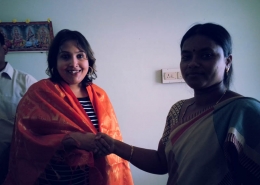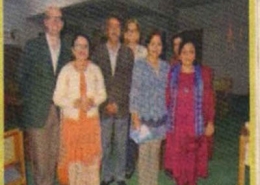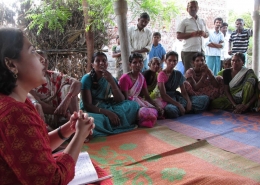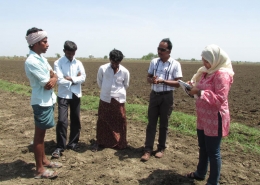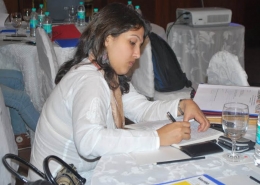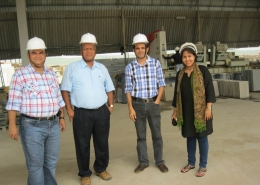Human Rights Impact Assessment Study / Research Studies and Remediation
Indian workers migrating to gulf and its impact on modern slavery: The current study is being funded and partnered by Global Fund to End Modern Slavery (GFEMS) and Business for Social Responsibility (BSR). The main aim of the study is to collect information of India and Bangladesh workers traveling to Gulf region for want of work to assess the issues concerning their recruitment practices, human rights abuses and concerns in the destination country, access to remedy in home/destination country and their awareness on the same. The study shall further profile worker communities and also various projects and channels (local and international) to enunciate the existing systems for migrant rights.
International Burmese migrant workers in agriculture farmland of Thailand: Etico conducted quantitative research on understanding the human rights violations and abuses of the vulnerable Burmese migrant workers migrated from Myanmar (Burma) in the corn farmland of northern Thailand, which shares its border. This study was funded by Fair Labor Association and Chinese seed company Syngenta. The push of Burmese workers has been factors like growing poverty owing to lack of employment opportunities, coupled with lack of stringent border security forces in Myanmar-Thailand border, and need of unskilled workforce for corn and other crop cultivation in northern Thailand. Almost 90 percent of the migrated workers do not have legal permit to migrate and as a result are exposed to multiple human rights abuses. From corrupt money lenders and recruitment agencies in Myanmar and Thailand to deplorable living and working conditions in Thailand, they are exposed to abuses at various levels. With no formal employment contract, they are dependent on the shelter provided by their farm employer, as a result there is less attention to legal working hours, compensation or benefits. There is no system where they would have access to remedy or any internal grievance channels. They are discouraged to form unions or representations. They don’t have access to clean drinking water, sanitation or basic healthcare. For fear of being caught by the officials in the city or a better health clinic, they are usually relegated to the rural suburbs.
International India migrant workers traveling to Qatar, for construction sites: A semi-quantitative research was conducted in India to assess the situation of international migrant workers, from the region of Uttar Pradesh and Orissa traveling to Qatar to work with the construction sites owned by Qatar based multinational company QDVC. The study was funded by QDVC and supported by Business for Social Responsibility. The main aim of the study was to conduct human rights impact assessment of the families of the migrant workers and the changes it brings in the socio-economic development pre-departure and post-arrival. The study also aimed in profiling the different recruitment agencies (headquarted in Mumbai, Maharashtra) to assess the system and govern its conduct on ethical practices. Report is not public, but more information can be gathered here: http://www.globalresearch.ca/modern-slavery-french-construction-company-vinci-accused-of-labor-violations-on-qatar-construction-contracts/5444245.
Coordinated with companies in India in establishing BSR’ HerProject: Etico’s lead Dr. Majumdar has coordinated and assisted BSR for almost 2 years in supporting and expanding the HerProject program across states in India, including HERhealth, HERfinance and HERrespect. The coordination has helped BSR to profile key local partners, build trust and transparency with local brand representatives, facilitate on time delivery of the project outcomes with regard to factory training, reporting and publishing.
Working condition analysis of alcohol industry in South India: Etico conducted HRIA to assess the working conditions in alcoholic beverage and spirit supply chain (funded by London based alcohol company Diageo). The aim of the study was to conduct a preliminary impact assessment of Diageo’s Human Rights Principles in its supply chain, especially located in the Maharashtra and Karnataka region. And to help recommend the company responsibilities in addressing the various challenges in various tiers and its chain, for further implementation.
Human Rights Impact Assessment (HRIA) study in Thiruvallur: To assess the working conditions of workers working in tyre manufacturing site located in Thiruvallur (Tamil Nadu for the France based tyre manufacturing company Michelin). The aim of the study was to gather the socio-economic and cultural impact of the establishment of the first multinational industrial company in a rural Thiruvallur and the impact of the industrialization on the local community members. Report is not public but more information can be gathered here: http://www.michelin.in/IN/en/why-michelin/more-on-brand-sustainability/michelin-tamil-nadu.html).
Decent work implementation of BCI code standards: Etico was commissioned by Ergon Associates to conduct human rights impact assessment study of the ‘decent work component of Better Cotton Initiative’ in Andhra Pradesh and Maharashtra. Report can be accessed here: http://bettercotton.org/wp-content/uploads/2014/01/BCI_decent_work_oct_2013_final.pdf).
Fair Wage, Worker Participation and Social Security: Etico has been leading various projects under Fair Labor Association to map the member company field situation on fair wages (including minimum wage implementation), worker participation through dialogue, internal grievance and collective bargaining and accessing social security benefits. These projects have been undertaken for its various member brands like Syngenta and H&M. More information can be accessed here: http://tp.fairlabor.org/en/introductions/sustainable-compliance-project-scope-outline and http://www.fairlabor.org/our-work/special-projects/project/fair-art.
Agreement on Sustainable Garment & Textile to address child labor in supply chain: Etico is associated with FLA which has partnered with Dutch multi-stakeholder Working Group on child labour and forced labor, namely Agreement on Sustainable Garment & Textile (AGT). One of the key responsibilities is to engage with international brands and local suppliers to map supply chain and facilitate the implementation of risk assessment of the supply chain for monitoring child labour and forced labour issues. This is a project in progress, more information can be gathered here: http://www.fairlabor.org/blog/entry/new-report-identifies-ways-mitigate-child-labor-risks-turkish-cotton-sector.


